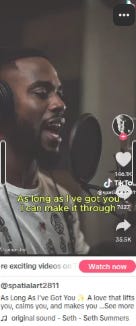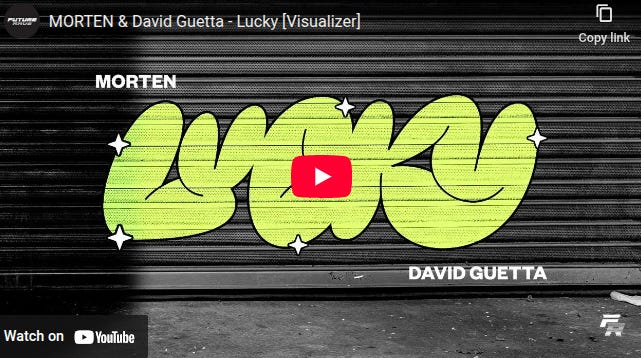🎵 AI Generated Songs - Can You Tell?
Why the Wedding Industry Must Become the Gatekeepers of Authentic Music.
Table of Contents:
My Confession
AI-Generated Music by the Numbers
What About Custom AI Wedding Songs?
The Copyright Conundrum
Quality, Fraud, and the Future
What Needs to Change
Conclusion
My Confession
The scary truth is, wedding couples might be unknowingly choosing an AI-only track for their most sacred musical moments. AI songs change the meaning of the music.
I recently discovered I promoted a song that was 100% created with AI. The song was from Amazon’s list of Hot New Releases in the R&B genre.
It was “As Long As I’ve Got You” by Seth Summers. The songwriting, the instruments, the singing artists - all generated with AI.
Not sure what you think of that, but it puts a rock in my stomach.
Here is the promotional clip of the song on TikTok.
The clip description does not mention anything about #AI. Think for a second. When scrolling through TikTok, how many times do you actually go to the poster’s profile to read the About section? The profile states “AI-powered songwriter”.
Imagine your first dance song, your processional, or the party anthem. Is it real? The scary truth is, wedding couples might be unknowingly choosing an AI-only track for their most sacred musical moments. That changes the meaning of the music!
AI-Generated Music by the Numbers
Deezer Data: The streaming service Deezer has been one of the most transparent platforms regarding AI content uploads. (Source)
As of September 2025, 28% of all tracks delivered to Deezer were reported as being fully AI-generated.
This represents over 30,000 fully AI-generated tracks submitted daily.
This percentage has shown rapid growth, up from approximately 10% in January and 18% in April of the same year.
A significant portion of this high volume is linked to fraudulent activity.
Deezer has found that up to 70% of the streams generated by fully AI-generated tracks on its platform are fraudulent (e.g., streaming farms used to generate illegitimate royalties).
The overall goal of this mass uploading is often to flood platforms with millions of fake songs and stream each one just enough to collect royalties without triggering immediate fraud detection systems.
Fraudulently creating AI-generated music doesn’t just dilute royalty pools; it clogs up music discovery tools (like those for DJs and couples) with low-quality, emotionally empty tracks. It makes finding that perfect, genuine song for your wedding playlists harder.
Impact on Charts and Commercial Success
High Commercial Potential: One projection estimates that roughly 30% of AI-generated songs are projected to perform successfully in commercial markets, charting on major platforms.
Viral AI-Generated “Artists”: Some synthetic music projects, like “The Velvet Sundown”, have gained significant traction, openly declaring themselves as AI-driven projects and earning substantial revenue, even reaching 277,827 monthly listeners on Spotify.
Future Revenue Risk: The widespread adoption of generative AI poses a major financial risk to the traditional music industry.
A study by the International Confederation of Societies of Authors and Composers (CISAC) predicts that AI-generated music could constitute 20% of traditional music streaming revenues and 60% of music libraries’ revenues by 2028. (Case Study)
Another report estimates that up to 23% of music creators’ revenues in certain markets could be at risk by 2028 if no action is taken to address the challenges of generative AI. (Source)
Consumer Acceptance
A recent report indicates that listener comfort with AI varies (Source):
About 1 in 3 U.S. music listeners are comfortable with AI creating song instrumentals.
However, 44% are uncomfortable with AI creating entirely new songs with an AI voice.
Fans of certain genres, like EDM and K-pop, appear to be notably more open to AI-generated music.
This data tells us that while a couple might be fine with an AI-instrumental during cocktail hour, 44% are uncomfortable with a fully AI-generated voice. For a wedding professional, this is critical: you must be the gatekeeper of authenticity. When in doubt, always default to a human-created track for high-emotion moments.
What About Custom AI Wedding Songs?
An application of AI songs does exist in the wedding space. There is a trend of AI being used to create fully custom songs that include a couple’s life story as a ballad. This sounds romantic, but remember the copyright issues (see below) and the question of genuine emotion. For example, a recent project recreated a late father’s voice for his daughter’s wedding. It was a beautiful, but ethically complex, use of the tech.
Yes, there are a growing number of case studies, reports, and data points that shed light on the volume of AI-generated music being produced and shared on streaming platforms, as well as its emerging presence on the charts.
The Copyright Conundrum
The Copyright Rule: The U.S. Copyright Office has made it clear: fully AI-generated music is NOT eligible for copyright protection because a work must have human authorship.
This means the AI-generated track a couple loves for their processional may actually be in the public domain, but the bigger danger is that the AI model itself was likely trained on copyrighted human music without permission. By promoting or playing these tracks, we are indirectly supporting a system that undermines the very artists we rely on for our business. The music industry’s biggest labels are actively suing AI companies over this. As a music professional, you need to be aware of this risk.
The Disclosure Mandate: If a song is partially created with AI (a human wrote the lyrics, AI did the backing track), the US Copyright Office requires the human author to disclose the AI usage.” This bolsters my call for an [AI] designation.
Quality, Fraud, and the Future
This video illustrates the lack of policing for songs being uploaded to streaming services. The problem with royalties with streaming services begins with more control over verified accounts and properly categorizing music. The video goes into depth if you want to learn more.
Now, as DJs, sampling is commonplace. Songs are easily manipulated through STEMS technology by removing vocals and instruments. I do like this as long as royalties are respectively shared with the original artists, etc.
An example of AI used in EDM hits is the song “Lucky” by MORTEN & David Guetta, released September 5, 2025. The vocals were entirely created using artificial intelligence (AI).
I am a classic rock fan. A TikTok profile, fakemusicbr, is converting songs to different genres utilizing AI. This is an example of converting the AC/DC song “Back In Black” from Hard Rock to Funk.
Don’t get me wrong, I was totally jamming out to this song - and I really like it. BUT, no humans are singing the lyrics, and no musicians are playing the instruments. That’s a tough swallow to play during a wedding.
What Needs to Change
In my opinion, there needs to be some sort of designation of AI being used to produce and create songs. Just as we have the [Explicit] designation on songs, we also need the [AI] designation on AI-created songs.
This isn’t just a political battle; it’s a quality-control issue for our industry. I propose that all ethical wedding music vendors (DJs, bands, planners) adopt a policy of transparency. We need to be the first to ask: ‘Was this song created by a human artist?’
Side Note: The most prominent congressional hearings on explicit lyrics took place in 1985, instigated by the Parents Music Resource Center (PMRC), a group of politically-connected wives in Washington, D.C., including Tipper Gore. Nothing on explicit lyrics since. Are we headed for the same conclusion for AI music? Time will tell.
Conclusion
My ‘rock in the stomach’ was my gut telling me AI music lacks the one thing a wedding is built on. It needs genuine human emotion and connection. We must listen to that gut.
This needs to be asked particularly for critical moments like the first dance, processional/recessional, and parent dances. Choose guaranteed human-authored music. As your wedding music expert, I commit to keeping you informed of every new change and legal development so we can keep wedding music genuine.
Have thoughts? Let me know in the comments.
Thanks for reading!
Matthew Campbell
Wedding MusicLetter







From DJ Steve-
I seem to remember when Electronic music became popular, the same argument arose, one guy playing every instrument and sound electronically, the only thing that was real were vocals, most of the time. Now it’s full circle, for that example Guetta, club music, I don’t seem to think it’s much of a problem. I don’t think it would play as well with other genres. AI is awesome but let’s not get too excited about it, Real Music, Real Singers will rule the day for a while yet, But I do see the dilemma.